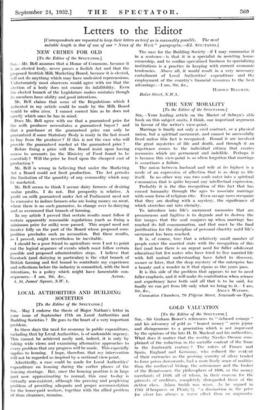Letters to the Editor
[Correspondents are requested to keep their letters as brief as is reasonably possible. The Me suitable length is that of one of our " News of the Weck " paragrapits.—Ed. SrEcrxroa] NEW CRIMES FOR OLD [To the Editor of the SPECTATOR.] tint,—Mr. Bell assumes that a•House of Commons, because it is an elected body, never passes a foolish Act and that the proposed Scottish Milk Marketing Board, because it is elected, will not do anything which may have undesired repercussions. l'nfortunately most observers would agree with me that,the election of a body does not ensure its infallibility. Even the elected branch of the Legislature makes mistakes though its members have ability and good intentions.
Mr. Bell claims that some of the Regulations which I indicated in my article could be made by the Milk Board would be ultra vises. I cannot correct him as he does not :.pecify which ones he has in mind.
Does Mr. Bell agree with me that a guaranteed price for the milk producer necessitates a guaranteed buyer ? and that a purchaser at the guaranteed price can only be guaranteed if some Statutory Body is ready in the last resort to buy from the producer ? If this is not the case who will provide the guaranteed market at the guaranteed price ?
Before fixing a price will the Board insist upon having access to accounts (as the Ministry of Food found to be essential) ? Will theprice be fixed upon the cheapest cost of production ?
Mr. Bell is wrong in believing that under the Marketing Act a Board could not limit production. The Act permits the limitation of the quantity of any commodity which may 1-c marketed.
Mr. Bell seems to think I accuse dairy farmers of desiring undue profits. I do not. But prosperity is relative. A profit on milk guaranteed under Act of Parliament need not be excessive to induce farmers who are losing money on meat, where there is no such guarantee, to change over to dairying and so overcrowd that branch' of farming.
In my article I proved that certain results must follow if certain apparently reasonable regulations (such as fixing a minimum price for milk) were passed. This sequel need not involve folly on the part of the Board whose proposed com- position precludes such an accusation. But these results, as I proved, might nevertheless be inevitable.
I should be a poor friend to agriculture were I not to point out the logical sequence of events which must follow certain possible and proposed administrative steps. I believe that livestock (and dairying in particular) is the vital branch of British farming and feel bound to contribute my experience and reflections before the industry is committed, with the best intentions, to a policy which might have lamentable con-






























 Previous page
Previous page